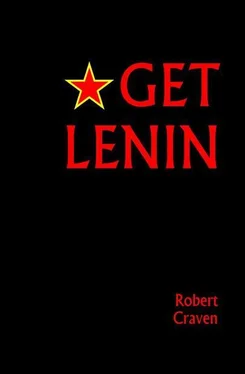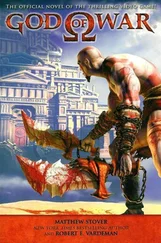Robert Craven - Get Lenin
Здесь есть возможность читать онлайн «Robert Craven - Get Lenin» весь текст электронной книги совершенно бесплатно (целиком полную версию без сокращений). В некоторых случаях можно слушать аудио, скачать через торрент в формате fb2 и присутствует краткое содержание. Жанр: Триллер, на английском языке. Описание произведения, (предисловие) а так же отзывы посетителей доступны на портале библиотеки ЛибКат.
- Название:Get Lenin
- Автор:
- Жанр:
- Год:неизвестен
- ISBN:нет данных
- Рейтинг книги:3 / 5. Голосов: 1
-
Избранное:Добавить в избранное
- Отзывы:
-
Ваша оценка:
- 60
- 1
- 2
- 3
- 4
- 5
Get Lenin: краткое содержание, описание и аннотация
Предлагаем к чтению аннотацию, описание, краткое содержание или предисловие (зависит от того, что написал сам автор книги «Get Lenin»). Если вы не нашли необходимую информацию о книге — напишите в комментариях, мы постараемся отыскать её.
Get Lenin — читать онлайн бесплатно полную книгу (весь текст) целиком
Ниже представлен текст книги, разбитый по страницам. Система сохранения места последней прочитанной страницы, позволяет с удобством читать онлайн бесплатно книгу «Get Lenin», без необходимости каждый раз заново искать на чём Вы остановились. Поставьте закладку, и сможете в любой момент перейти на страницу, на которой закончили чтение.
Интервал:
Закладка:
Brandt felt cut adrift with no role in the army any more as, for all intents and purposes, his unit had ceased to exist. That chicken farmer Himmler’s SS could make up any story they wanted. He felt spent. The past few weeks he had witnessed professional soldiers cracking under extreme pressure. He himself had noticed a shake developing in his hand after a mission to take a village a week earlier. It had not gone well and his unit had taken heavy casualties. The Russians had fought bravely even through heavy artillery shelling and JU 87 bombardments. One of his junior officers, Peter Schelling, a former sales clerk from Bremen, had blown his brains out in his quarters to be found by Brandt a few hours later, an empty bottle of vodka lying by his side. It was becoming a common occurrence. Russia was sucking in the German army and grinding it into the snow beneath its heel.
He knew also this situation they were in was payback for what had happened in Norway four months earlier where an SS officer had lost his footing during an ascent, dragging Brandt’s unit almost off a cliff-face into the fjord below. Brandt cut the man’s rope, saving his comrades and spilling the officer over the side. Himmler hadn’t liked that. Within a week they were on the Eastern Front fighting on the frontline.
Brandt stared out through the carriage door. Absent-mindedly he wound his father’s wrist watch, his thoughts drifting to home. Every day through his childhood he would cycle out to the veterans' hospital where his father, Michael, lay twisted and broken. A Captain at Verdun, he was a strong physical man, an accomplished rower who had been in a trench heavily shelled by the French Army in April 1917. The sole survivor, he had been buried for days under the mud before being recovered. His two arms had had to be amputated from the elbow and his spine was mangled, yet his desire to survive drove him. As he lay motionless in the sheets, he kept his mind active. He learned to play chess and would call out moves to the other veterans in the ward. Within a year all the men were holding tournaments in their heads playing against each other. Brandt admired his father and came to love his flattened features, a portion of the man who went to war. He admired the way he accepted and adapted to his circumstances while others in the ward had lost their minds or attempted suicide. Despite Brandt missing out on a place in the 1936 Olympic squad, Michael in turn admired his son's stoicism and encouraged him to keep going.
‘In the end that’s all there is,’ he’d say. ‘Be like a shark, Nicky. Never stop, ever. If you stop, you sink and drown,’
He had to keep going. His team needed it. They, including the Russian, were now his responsibility. He had to lead them out of this mess. This new situation presented an opportunity for operating with greater latitude. They were, in the words of the Russian, ‘walking in dead men’s shoes’. He liked him not as an efficient enemy soldier but as a man. There was as simple solution: they had to move quickly to keep Lenin in Russia.
The carriage had sustained heavy damage from the fighter attack. Outside, Uwe Koheller lay dead. Brandt had removed Koheller’s dog-tags then had his body carefully placed alongside Schultz away from the SS troopers. Brandt recited the snatches of a prayer he’d remembered over his two fallen comrades. ‘When these days are forever past, please bring to all a peace to last. When the sun shines through the rain, thy weary heart shall bear no pain. And when you bring this peace to men, please send us homeward — once again.’
He recalled their first mission in Poland’s Tatra Mountains, their actions in the French Alps and their love of climbing above politics, beliefs or war. They were climbers who were conscripted soldiers. A toast of vodka was raised and Kravchenko was invited to toast also. He saluted in Russian. Brandt realised at that point they were a very, very long way from home.
He looked around the carriage. They were all looking at him. He’d have loved to hand the command over to the Russian, but he was injured and exhausted. Brandt sighed; it took a moment to follow through with his thoughts;
‘We retrieve the cameras and kill Kincaid and Regan. We have to make this look like it never happened. We’ll use Lenin as a guarantee of safe passage to Switzerland. The high command don’t want us to exist. We’ll oblige them on our terms. I’ve had enough of this war,’
As Kramer translated Brandt's words, Kravchenko pondered the idea. His thoughts were of home and his family, his young wife Sonja and his four year old son. The damage done to the train meant he could now be listed as dead. Should he be caught, he’d be branded a political traitor and he and his family would be residing in Kolyma before the end of the year. He could be either dead as a hero or dead as a traitor. He smiled wryly to himself that death seemed to be joined to his hip since this afternoon. The German’s plan added another option to lying in an unmarked grave somewhere. Tears welled up in his eyes, possibly delayed shock, but more that he would never see little Oleg again.
He nodded in agreement. If he came out of this in one piece, he’d slip into some other Russian unit heading home when the war ended. He vowed to see Oleg and his wife Sonja again, alive.
Kramer, Kant, Olga, Koheller, Bader and Hauptmann sat quietly, letting the idea of deserting and living in a neutral country sink in. This was the first time they had heard their leader, their friend, ever speak like this. They, like him, were sickened at the betrayal. In war life was cheap but this was straightforward treachery. Had Fretter-Pico known? Rathenow? He hadn’t turned the airship around once the shooting started. How high up the chain of command did this set-up go?
‘I climbed the Eiger before the war; a very difficult climb. We could sit out the war in Berne sipping Kirsch,’ mused Kramer aloud, his voice echoing around the carriage. He started to grin at the thought. His creased face resembled a relief map of the moon.
Kant pulled Olga closer. ‘I go where this little lady goes.’
Rank and enemy status were forgottten for an instant. They could’ve been strangers on a train in peacetime striking up a conversation. Then, with a collective grunt, they started preparations for departure.
Hauptmann, Bader and Voight gathered provisions, prepared a fire and began an inventory of weapons, equipment and, most importantly; ammunition.
The half-track was destroyed with no possibility of its being used ever again. The remaining German bodies were lined up on the river bank and any useful item — knives, pistols, ammunition and warm clothing — removed. There was one odd discovery — none of the SS had dog-tags. Kramer checked under the arm of each corpse for tattoos identifying regiment and blood group. They had none. The fighter pilots' billets yielded more cold food, coffee and chocolate, a full bottle of vodka, some half-eaten bread, cheese and sausage abandoned when the carriage arrived. They were quickly consumed.
Kravchenko declined to eat, allowing his new-found comrades to enjoy his ration. If they were to push out on foot avoiding the Russian Army, they were going to need nutrition. Olga had sourced her lichen for brewing and once the small fire was blazing, some of Kincaid’s silver coffee pots were placed on it for the water to boil.
A hurried meal was consumed and the vodka bottle was passed around. Lichen tea followed and those that didn’t retch felt the beginnings of being alive again.
Russian and German army maps were examined on the table where the sarcophagus had lain. One of Regan’s lamps, jerry-rigged to the on-board generator, cast harsh light and shadows across the page. Sunken cheekbones and eyes worked in deep shadows as the lights began to flicker. The generator was beginning to fail.
Читать дальшеИнтервал:
Закладка:
Похожие книги на «Get Lenin»
Представляем Вашему вниманию похожие книги на «Get Lenin» списком для выбора. Мы отобрали схожую по названию и смыслу литературу в надежде предоставить читателям больше вариантов отыскать новые, интересные, ещё непрочитанные произведения.
Обсуждение, отзывы о книге «Get Lenin» и просто собственные мнения читателей. Оставьте ваши комментарии, напишите, что Вы думаете о произведении, его смысле или главных героях. Укажите что конкретно понравилось, а что нет, и почему Вы так считаете.











